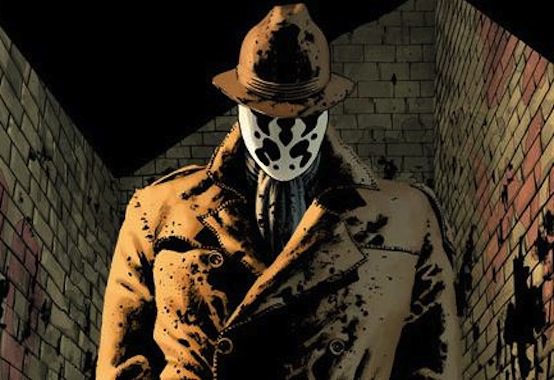This week I read the first issue of Watchmen by Alan Moore. I was surprised right off the bat by how dark and overtly political the comic was. Right in the opening scene, Rorschach talks bitterly about "the accumulated filth" of the city drowning in blood. For a comic from as big a publisher as D.C. to display such cynicism, I can definitely see how Watchmen expanded the genre in comics.

One thing I really enjoyed about Watchmen that I don't see in other comics is how dark the humor is. As we see in the beginning of the comic, Rorschach often delivers monologues via a diary he keeps. This is often where Moore's sense of humor can be seen. In one scene, for example, Rorschach spends a disproportionate amount of time talking about how many kids his neighbor has and how she is probably abusing welfare–it's funny because of how small an issue it is that Rorschach is devoting his energies to. Rorschach also comes across as a bit comedic to me because of how angsty he is. When he mumbles about how "no one cares but me," Rorschach almost comes across as a teenager.

Although I enjoyed Allen Moore's unique spin on Watchmen, one part that did bother me was the length text in the middle of the issue explaining the back story of one of the characters. Although I love reading, and actually enjoy novels more than comics, something about expecting a comic and getting pages and pages of text bothered me.

One thing I really enjoyed about Watchmen that I don't see in other comics is how dark the humor is. As we see in the beginning of the comic, Rorschach often delivers monologues via a diary he keeps. This is often where Moore's sense of humor can be seen. In one scene, for example, Rorschach spends a disproportionate amount of time talking about how many kids his neighbor has and how she is probably abusing welfare–it's funny because of how small an issue it is that Rorschach is devoting his energies to. Rorschach also comes across as a bit comedic to me because of how angsty he is. When he mumbles about how "no one cares but me," Rorschach almost comes across as a teenager.

Although I enjoyed Allen Moore's unique spin on Watchmen, one part that did bother me was the length text in the middle of the issue explaining the back story of one of the characters. Although I love reading, and actually enjoy novels more than comics, something about expecting a comic and getting pages and pages of text bothered me.
Comments
Post a Comment